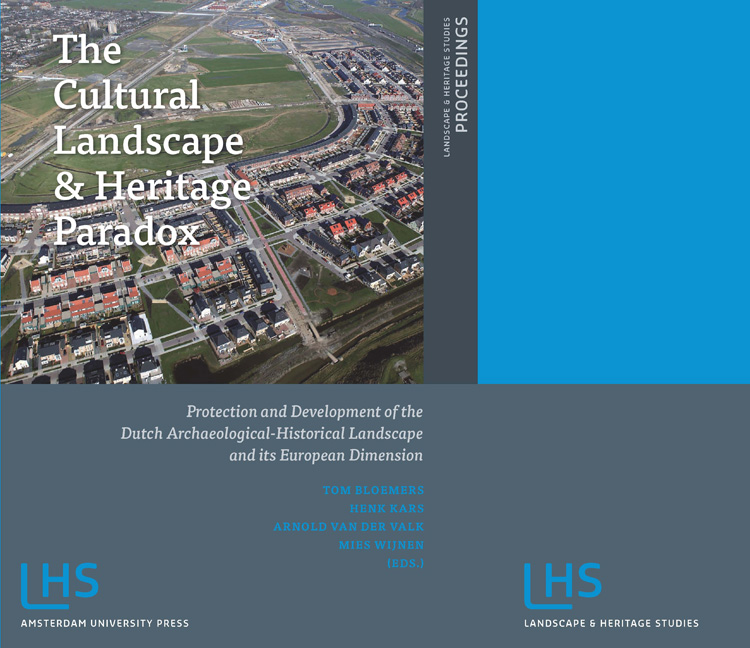 The Cultural Landscape and Heritage Paradox
The Cultural Landscape and Heritage Paradox Book contents
- Frontmatter
- Contents
- Preface
- I INTRODUCTION
- II INSIGHTS AND PROSPECTS OF ARCHAEOLOGICAL-HISTORICAL LANDSCAPE STUDIES
- III LINKING KNOWLEDGE AND ACTION
- IV IMAGINATION - FACTS AND CONSTRUCTIONS
- V SHARING KNOWLEDGE - STORIES, MAPS AND DESIGN
- VI SYNTHESIS AND CONCLUSIONS
- VII MANAGEMENT OF KNOWLEDGE
- VIII AGENDA FOR THE FUTURE
- IX SUMMARY
- X APPENDIX
- Subject Index
- Index of Places and Regions
7 - The PDL/BBO Research Programme Analysed from the perspective of Knowledge Management
Published online by Cambridge University Press: 21 January 2021
- Frontmatter
- Contents
- Preface
- I INTRODUCTION
- II INSIGHTS AND PROSPECTS OF ARCHAEOLOGICAL-HISTORICAL LANDSCAPE STUDIES
- III LINKING KNOWLEDGE AND ACTION
- IV IMAGINATION - FACTS AND CONSTRUCTIONS
- V SHARING KNOWLEDGE - STORIES, MAPS AND DESIGN
- VI SYNTHESIS AND CONCLUSIONS
- VII MANAGEMENT OF KNOWLEDGE
- VIII AGENDA FOR THE FUTURE
- IX SUMMARY
- X APPENDIX
- Subject Index
- Index of Places and Regions
Summary
ABSTRACT
The PDL/BBO research programme's knowledge management has been analysed from two perspectives. The first concerns the integrative approach of landscape research using the model of Tress et al. (Tress/ Tress/Fry 2006) to handle challenges, the second is about the process of knowledge creation following Weggeman (Weggeman 2001, 28-41). He defines knowledge as “the partially unconscious capacity that is represented by the function of Information, Experience, Ability and Attitude of someone”. Reflecting on the programme as an entity, the role of these four elements and the way they have influenced the creation of (new) knowledge is described.
The PDL/BBO programme (2000-2009) aimed at the development of social relevant scientific knowledge by establishing a meaningful link between scientific knowledge, archaeological-historical resource management and applied planning policy. The programme was divided into three types of research arranged in short (4-5 months) and long-term (4-5 years) studies: ten commissioned problem-oriented short-term, two conceptual studies and eleven strategic long-term projects selected in open competition. The concept of biography of landscape and the method of action research acted as anchor points for the assessment and selection of research proposals.
External assessments supported quality management and integration of knowledge. In 2003 NWO arranged for a mid-term evaluation by an international audit committee and in 2008/9 for an assessment of the societal impact. To strengthen the integration from 2006 onwards internal regional and thematic workshops were organized and the co-operation with the ‘Onderwijsnetwerk Belvedere’ started.
Newly created knowledge concerns the application of the biography concept in the four regionally oriented programmes, specific in the context of action in policy and practice to unify research and action. The new knowledge created by the thematic line of research can be labelled as interpretative heritage research, namely exploring data from an innovative research perspective and reflecting upon the process of giving them meaning and handling them.
The organization of the knowledge creation in the PDL/BBO research programme can be described as a ‘fuzzy structure’ in the sense of Weggeman. A fuzzy structure is more a non-structure than a structure, where learning and adapting are of great importance and various strategies are involved during the research process.
- Type
- Chapter
- Information
- The Cultural Landscape and Heritage ParadoxProtection and Development of the Dutch Archaeological-Historical Landscape and its European Dimension, pp. 585 - 604Publisher: Amsterdam University PressPrint publication year: 2010


